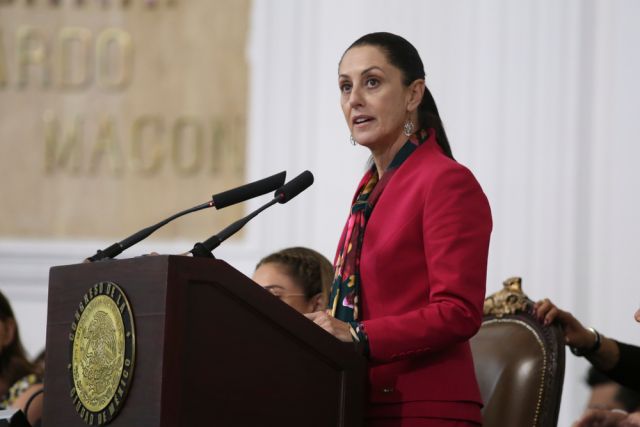
Claudia Sheinbaum, mayor of Mexico City and vying to becoming Mexico’s next president this summer, says she isn’t in favor of an absolute privatization of the energy sector, but isn’t against private investments either. (Source: Shutterstock)
Mexican presidential candidate Claudia Sheinbaum, during an interview with Bloomberg, said the “absolute privatization model” hadn’t worked in Mexico, and if elected president, she would continue to take into account Mexico’s energy sovereignty while keeping the door open to private investments.
“I believe that the absolute privatization model for the energy sector hasn’t produced results anywhere in the world, including in Mexico,” Sheinbaum said during a video interview with Bloomberg on April 20.
“With the energy reform of 2013, Pemex’s debt rose while its production declined,” Sheinbaum said.
Sheinbaum, who is the mayor of Mexico City, is in favor of a new vision for the country and state-owned Petróleos Mexicanos (Pemex), currently under the supervision of Mexico’s President Andrés Manuel López Obrador.
That vision, according to Sheinbaum, implies “clear rules for the national and sovereign development of the Federal Electricity Commission (CFE) and Pemex, as well as investments from private companies where the rules are also clear.”
Mexico City-based Pemex is the world’s most indebted energy company. Its long-term debt was $106.1 billion at year-end 2023.
Sheinbaum said the largest increase in Pemex’s debt occurred during the presidency before Obrador. She said some debt has been reduced but the amount was “still significant.”
Sheinbaum said there was a possibility to refinance Pemex’s debt. But it would have to be associated with the “production of oil, the refining of [petroleum] and the entry of Pemex into other electricity generation schemes, such as cogeneration.”
Sheinbaum said bringing stability to Pemex had to take into account its historical significance as well as a long-term vision of the company under its own energy transition. Pemex has long been a source of operational pride in Mexico, and financially, the company continues to make significant payments to the Mexican government in the form of taxes and duties.
“We need to advance a vision to decarbonize the economy and [determine] at what point we will continue producing petroleum and also [determine] how Pemex will enter into cogeneration, as well as [exploring the] possibility that Pemex assists in the exploitation of lithium,” Sheinbaum said.
Sheinbaum said a major focus of her presidency would be on boosting Mexico’s connectivity as a whole—specifically its ports, roads, freight and passenger railways, as well as internet connectivity, Sheinbaum said.
Sheinbaum said she plans to have a good relationship with whomever is the next U.S. president come Nov. 8.
“We have a very strong economic integration with the U.S.—today we are the U.S.’ main trading partner, and this obligates us to have a good relationship,” Sheinbaum said.
Mexico holds its presidential elections on June 2.
Recommended Reading
Chevron to Lay Off 15% to 20% of Global Workforce
2025-02-12 - At the end of 2023, Chevron employed 40,212 people across its operations. A layoff of 20% of total employees would be about 8,000 people.
The New Minerals Frontier Expands Beyond Oil, Gas
2025-04-09 - How to navigate the minerals sector in the era of competition, alternative investments and the AI-powered boom.
Murphy Shares Drop on 4Q Miss, but ’25 Plans Show Promise
2025-02-02 - Murphy Oil’s fourth-quarter 2024 output missed analysts’ expectations, but analysts see upside with a robust Eagle Ford Shale drilling program and the international E&P’s discovery offshore Vietnam.
Hess Corp. Bucks E&P Trend, Grows Bakken Production by 7%
2025-01-29 - Hess Corp. “continues to make the most of its independent status,” delivering earnings driven by higher crude production and lower operating costs, an analyst said.
Comments
Add new comment
This conversation is moderated according to Hart Energy community rules. Please read the rules before joining the discussion. If you’re experiencing any technical problems, please contact our customer care team.



